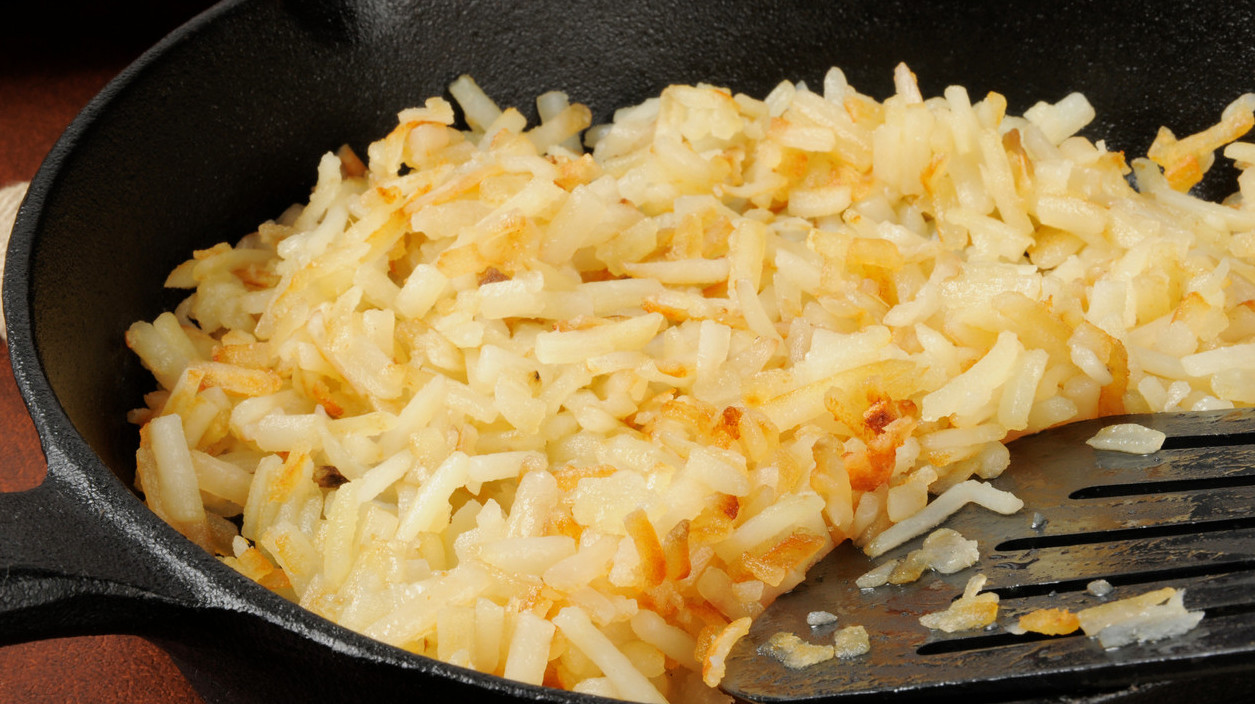Buying Frozen Hash Browns Is Not Only Acceptable, But Encouraged
I'm a champion of homemade things. Ricotta cheese is a hundred times more flavorful when you take the time to boil a little milk and strain it through cheesecloth. Chicken stock has more depth when it's simmered on a stove for eight hours. Pasta has an irreplaceable, fluffy, eggy texture when you decide to strain your forearms kneading dough. Home cooking bears extraordinary rewards, but still, exceptions do exist. There are some things that culinary chemists have perfected in their laboratories, foods that somehow improve when the human element is taken out completely. To spend time making them from scratch would be a fool's errand, and buddy, one thing that should never be attempted is homemade hash browns. Frozen diner-quality Great Value floor-model-cost shredded breakfast hash browns are a thing of beauty, and you won't do better yourself.
Don't take it from me. I asked Bob Broskey, formerly of Beacon Tavern and two Michelin-starred L20 (and set to open RPM Seafood in Chicago this spring), what he thought about making hash browns from scratch. His response? "The only thing more silly would be to make your own ketchup." An excellent point indeed, Broskey. We've all rolled our eyes at homemade ketchup. It just doesn't compare to the unholy concoction of high-fructose corn syrup, spices, vinegar, and tomato concentrate that comprise a bottle of Heinz. But while there's at least a compelling case to be made for homemade ketchup—it's more natural, it's healthier, etc.—frozen hash browns aren't all that different from the ones you grate yourself. Look at the ingredients listed on the bag; you won't find a ton of additives.
Purchase hash browns at the supermarket and you'll likely see the same three ingredients: potatoes, dextrose, and sodium acid pyrophosphate. Dextrose is a sugar that helps with browning, and sodium acid pyrophosphate helps the potatoes retain their natural color. All things considered, that's only three ingredients, which is about 17 less than I'd expect out of the frozen foods aisle. Minimalist, if you ask me.
Preparing hash browns at home is a meaningless task when factories are already doing the work more efficiently: a series of machines grating, rinsing, and drying the potatoes for you. Why would I grate potatoes if I can avoid it? Potatoes aren't exactly an easy thing to dry, either. You can pat them down with a towel or wring them out in several paper towels, but the fact is, factories are using professional machinery to suck out all the moisture. It's difficult to compete with that. Try to fry damp potatoes and you're going to wind up with a goopy, starchy mess. The early morning is no time to make extra work for yourself.
The spirit of American breakfast is simplicity both in consumption and preparation. Eggs, bacon, toast—these are things that are easy to cook, and to cook simultaneously. Don't create more work for yourself when the rewards aren't there.
Whether you grate your potatoes or buy them bagged, you're still giving yourself the homemade experience. And with its low moisture levels and ease of frying, the bagged stuff will get you one step closer to the most delicious version of hash browns known to exist: McDonald's hash browns, the G.O.A.T. of fast food breakfast sides. Crackling texture, golden brown color, savory flavor, genius wrapper—you're in denial if you aren't worshiping those hash browns.
But there's a reason that fast food hash browns are so good, and it's not just a matter of frozen vs. fresh potatoes. Peep these additional ingredients:

Good ol' natural beef flavor! McDonald's stopped frying things in beef tallow way back in 1990, but they're absolutely adding beef dust flavoring somewhere on that production line. Making great hash browns at home is definitely possible; making them taste like they're infused with donuts and beef is probably not.
Also, let my tombstone read: Cooked In The Same Fryer That We Use For Donut Sticks.
